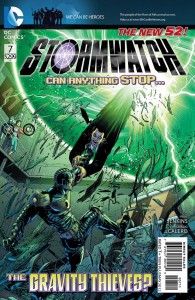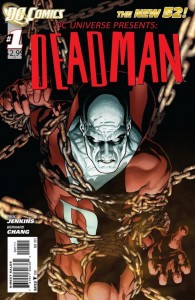 I’m about a week late to the party on this one, but the parade of talent walking away from DC Comics has added Paul Jenkins, who did the opening Deadman arc on DC Universe Presents, as well as a pretty decent fill-in on Stormwatch, and until recently was writing Batman: The Dark Knight.
I’m about a week late to the party on this one, but the parade of talent walking away from DC Comics has added Paul Jenkins, who did the opening Deadman arc on DC Universe Presents, as well as a pretty decent fill-in on Stormwatch, and until recently was writing Batman: The Dark Knight.
Jenkins apparently has made the decision to walk away from both DC and Marvel to work exclusively for Boom Studios, currently writing Deathmatch for them. Which is fine; creators sometimes make the move to creator-owned comics from the Big Two – if I wrote comics, I’d be pounding on every indie publisher’s doors with creator owned ideas in the hopes of getting a TV contract and the keys to the Rich Guy’s Pissoir where Robert Kirkman currently pisses into Perrier.
Jenkins, however, rather than simply walking away to pursue his own projects, took a page from well-known people person Rob Liefeld and dynamited all his bridges by publishing an open letter regarding his reasons for leaving DC at Comic Book Resources:
I hope those reading this will agree the discussion will be worth their time. I feel that we are once again moving in the wrong direction, creatively. I’ve been down this road before, and it’s a road we can and should avoid. I don’t need to tell you what Greg Rucka and numerous other respected creators have already told you – that the Big Two have removed their focus away from the creators and towards the maintenance of the characters…
I know when it was a lot easier, and that was back in the days of Marvel Knights. In those times, Marvel had been in bankruptcy, and they had little choice but to allow the creators the freedom and trust that so many of us deserve… I look back on “Inhumans” and “Sentry,” on my Spidey runs with Bucky [Mark Buckingham] and Humberto [Ramos], and on various successes with “Wolverine: Origin” and others, and I know – because I was there – that they succeeded in large part because I was given freedom to create without being handicapped by editorial mandates. It just hasn’t been that way for a while. In recent years, I have watched, helpless, as editors made pointless and destructive changes to scripts and artwork that they had previously left alone. It bugs me that the creators were a primary focus when the mainstream publishers needed them, and now that the corporations are driving the boat, creative decisions are being made once again by shareholders.
Wow. Okay, there’s certainly an discussion to be had about the state of both Marvel and DC in the age of the blockbuster superhero movie, and after each publisher has either been bought up by a huge multinational corporation, or more closely folded into the huge multinational corporation who already owned them. God knows that, as a reader in the early 2000s, I felt like there was a sense of experimentation and a focus on new kinds of stories that I hadn’t felt from almost anyone outside of Vertigo Comics since the early 90s.
But I thought that DC’s New 52 was supposed to replicate that feeling by blowing continuity out of the water and starting over with A-List creators and allowing them to run wild with these long-running properties, right, Paul?


 Podcast RSS Feed
Podcast RSS Feed iTunes
iTunes Google Play
Google Play Stitcher
Stitcher TuneIn Radio
TuneIn Radio Android
Android Miro Media Player
Miro Media Player Comics Podcast Network
Comics Podcast Network